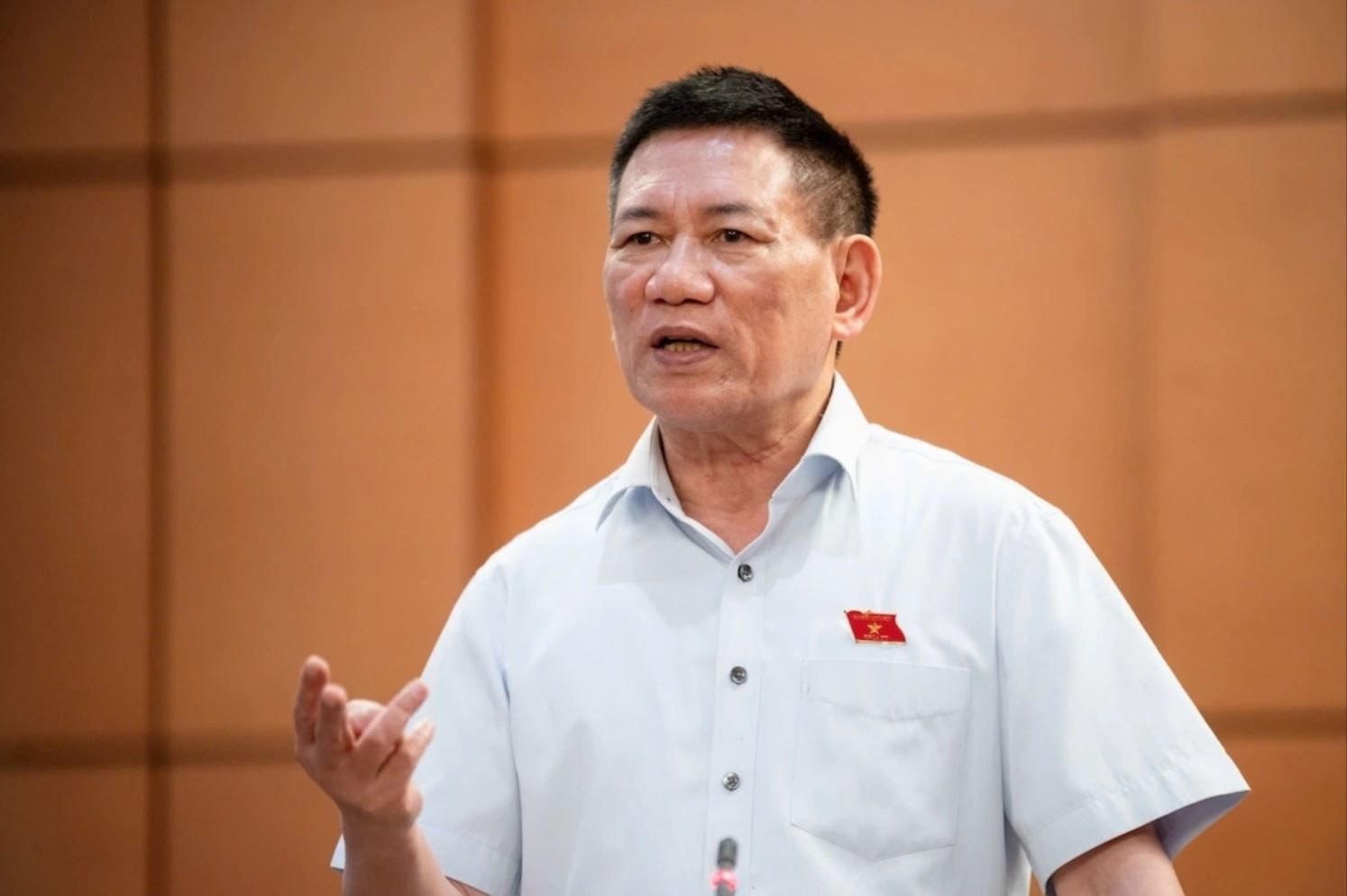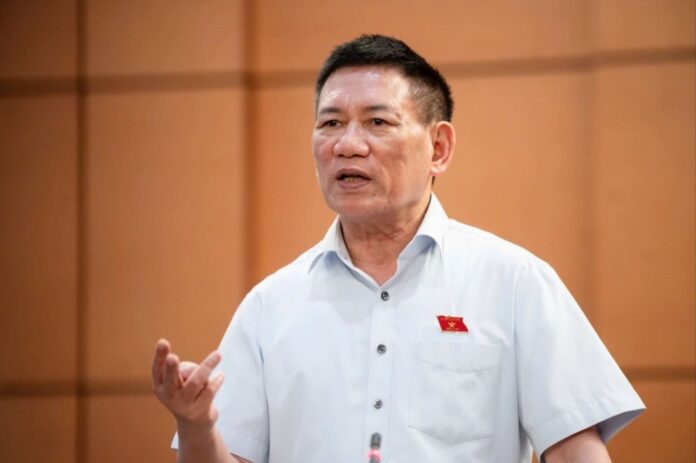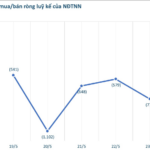
Deputy Prime Minister Ho Duc Phoc speaks during the group discussion on May 21st. Photo: Quochoi.vn
During the 15th National Assembly’s 9th session, while discussing the draft resolution on piloting several special mechanisms for social housing development on May 21st, Deputy Prime Minister Ho Duc Phoc mentioned the National Housing Fund, which will be funded by the state budget and other sources such as voluntary contributions from investors and land funds from commercial housing projects allocated for social housing construction.
“This fund is tasked with creating affordable and social housing for young people who don’t own a home yet. In other words, social housing is just one part of the fund’s investment portfolio. The fund operates on a preservation and non-profit basis as it also has an investment mission, allowing it to develop low-cost housing for citizens,” explained Deputy Prime Minister Ho Duc Phoc.
According to the draft resolution, the National Housing Fund will be established at both central and local levels. At the central level, the Ministry of Construction will manage the fund to develop certain projects and allocate resources to localities that cannot balance their budgets. Locally, the Chairman of the People’s Committee has the authority to establish the fund and assign the Department of Construction to manage it.
“We expect this fund to support the promotion of social housing and affordable housing for low-income and young people,” shared Deputy Prime Minister Ho Duc Phoc.
Previously, National Assembly delegates contributed their opinions on the establishment of the National Housing Fund, emphasizing the need for sustainable financial resources and a well-calculated capital structure. They expressed concerns about the potential disruption to the budget structure and fiscal balance due to the formation of numerous extra-budgetary funds at the same time, requiring substantial capital.
According to Ms. Pham Thuy Chinh, Vice Chairman of the National Assembly’s Committee for Economic and Financial Affairs, some large localities like Ho Chi Minh City and Dong Nai have established similar funds for social housing development, but the outcomes have not met expectations due to a lack of charter capital.
Questioning the dependence of the National Housing Fund on the state budget, Ms. Chinh suggested that the fund should cease operations in 2030, coinciding with the goal of completing one million social housing units. In response, Deputy Prime Minister Ho Duc Phoc assured that “the fund’s operation will have a negligible impact on budget management.”
Experts provide suggestions on the establishment and operation of the National Housing Fund
Regarding the study on establishing the National Housing Fund, Mr. Le Hoang Chau, Chairman of the Ho Chi Minh City Real Estate Association (HoREA), stated that the fund would help coordinate resources to promote the development of affordable housing, including both social housing and commercial low-cost housing.
Mr. Chau suggested that the support mechanism of the National Housing Fund should include the development of commercial affordable housing. One of the biggest challenges currently is the stagnation of hundreds of projects.
PGS. TS Dinh Trong Thinh emphasized that the key to the effective operation and sustainable development of the National Housing Fund lies in its capital sources. He proposed that capital could come from various channels, with state budget resources serving as “seed money,” which is crucial for the fund’s operation.
Mr. Nguyen Quoc Anh, Deputy General Director of Batdongsan.com.vn, pointed out the rapid increase in housing demand in densely populated areas like Hanoi, Ho Chi Minh City, Binh Duong, and Dong Nai. Meanwhile, the development of affordable and social housing has lagged, leading to a severe shortage of such properties. In this context, establishing the National Housing Fund is a feasible and innovative solution that contributes to both social welfare and economic growth.
Dr. Nguyen Van Dinh, Chairman of the Vietnam Real Estate Brokers Association (VARS), acknowledged Vietnam’s significant achievements in economic development and urbanization over the past decades. However, social housing and affordable rental housing have not kept pace with the needs of the working population. In some industrial zones, workers often rent inadequate and unsafe accommodations. This situation needs to be addressed promptly.
Dr. Dinh suggested that to establish the National Housing Fund, the state needs to have a clear land fund and planning for housing development. Efficient utilization of public land, along with preferential policies, will facilitate the construction of projects that cater to the needs of the people.
Additionally, the collective effort of the working population is essential. This solution embodies a high level of socialization and demonstrates each individual’s responsibility to the community. At the same time, real estate businesses must explicitly demonstrate their accountability in this endeavor.
According to Mr. Nguyen Quoc Anh, to enable more people to buy homes, access to capital is crucial. Previously, there was a VND 120,000 billion fund contributed by banks, but it still operated for profit, making it unattractive in reality. If the National Housing Fund is established with the state playing a coordinating role and offering reasonable interest rates and loan durations, people will have a better opportunity to purchase homes. This fund, sourced from the social insurance funds of the people, will support the very people it serves. However, careful consideration must be given to the approval and supervision mechanisms to ensure efficiency, transparency, and prevent losses.
“The Debut of Minotti’s First Monobrand Showroom in Vietnam: A Testament to EuroStyle’s Craftsmanship and Design Excellence”
Minotti, the epitome of Italian luxury furniture, proudly unveils its first monobrand showroom in Vietnam, marking a pivotal moment in bringing the quintessential ‘Made in Italy’ lifestyle within reach of Vietnamese clientele.
A New Name, A New Vision: Petrovietnam’s Strategic Pivot in the Energy Evolution
“The renaming of the Vietnam Oil and Gas Group to the Vietnam National Industry-Energy Group marks a strategic turning point, reflecting ambitious aspirations but also posing significant challenges in the journey of transformation. This evolution in development model signals a pivotal moment for the organization, as aptly noted by Mr. Le Tho Binh, Vice President of the Vietnam Digital Communications Association.”
The Easiest Place to Earn Big in Vietnam: Where Expensive Living Meets High Incomes
“The province of Binh Duong continues to lead the nation in per capita income, with Ho Chi Minh City and Hanoi also making it to the top five. However, it is Hanoi that boasts the highest income and, subsequently, the most expensive cost of living across Vietnam. This financial hub boasts a thriving economy and a vibrant cultural scene, making it an attractive prospect for businesses and individuals alike.”
“Vietnam-US Bilateral Trade Talks: Positive Outcomes and the Road Ahead for June 2025”
The second round of negotiations for the Bilateral Reciprocal Trade Agreement between Vietnam and the United States took place from May 19 to 22, 2025, in Washington, D.C. This highly anticipated event marked a significant step forward in strengthening the economic relationship between the two nations.














































